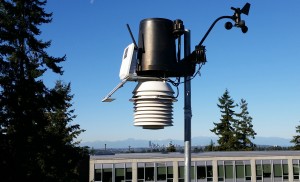
Some people like to talk about the weather and that is certainly true of faculty member Kent Short, but this guy actually knows what he’s talking about. Short, the founding Chair of the Earth and Space Sciences program and Assistant Dean of the Science Division at BC, teaches several Meteorology classes and also manages the Bellevue College weather station.
The weather station is an outdoor instrument that measures weather conditions, including barometer readings, temperature, humidity, rain rate, wind chill, UV and solar radiation. Using this device, weather information is made available on the Bellevue College website: scidiv.bellevuecollege.edu/weather/Bellevue/Current_Vantage_Pro_Plus.htm. BC’s weather report is a service for students, employees, and community members.
Meteorology is one of five sciences that comprise the Earth and Space Sciences Program (the others are Astronomy, Geology, Oceanography, and Environmental Science) at Bellevue College. Meteorology, the study of weather and climate, get its name from the Greek word meteoros, meaning “high in the air.” To the ancient Greeks, a meteor was anything that fell from the sky, including water or ice. To this day, meteorologists refer to various types of precipitation (raindrops, hailstones, snowflakes) as “hydrometeors.” Modern meteorologists study not only precipitation but everything to do with the Earth’s atmosphere, including clouds, winds, temperature variations, severe storms, and climate changes such as global warming, and much more.
Short’s passion for the subject of meteorology is one reason why his students give him excellent reviews. Taking Meteorology fulfills a science requirement toward graduation, but it can also inspire an interest in atmospheric and space sciences, including meteorology, that can lead to further education to pursue a career as a meteorologist.
Program Chair Kent Short Brings Experience to Curriculum Development and Teaching
 Prior to becoming an educator, Kent Short’s career included several years of professional experience as a meteorologist and oceanographer with NOAA, and as an environmental scientist with both large and small consulting firms. His professional assignments ranged from conducting oceanographic research in the Arctic Ocean near Prudhoe Bay, Alaska, to serving as a member of the official NOAA Weather Support Team for the 1984 Olympic Games in Los Angeles. His educational background includes a Bachelor’s Degree in Meteorology from UCLA and a Master’s Degree in Oceanography from Oregon State University.
Prior to becoming an educator, Kent Short’s career included several years of professional experience as a meteorologist and oceanographer with NOAA, and as an environmental scientist with both large and small consulting firms. His professional assignments ranged from conducting oceanographic research in the Arctic Ocean near Prudhoe Bay, Alaska, to serving as a member of the official NOAA Weather Support Team for the 1984 Olympic Games in Los Angeles. His educational background includes a Bachelor’s Degree in Meteorology from UCLA and a Master’s Degree in Oceanography from Oregon State University.
Short has been at BC since Fall 1998, teaching Meteorology 101, along with various other courses, including Meteorology 211 (Global Climate Change), Oceanography 101 (Introduction to Oceanography), Oceanography 110 (Environmental Oceanography), Environmental Science 100 (Survey of Environmental Science), Environmental Science 250 (Puget Sound Ecology), and the Current Issues in Environmental Science seminar series (ENVS 281, 282, 283).
Last Updated October 3, 2016
